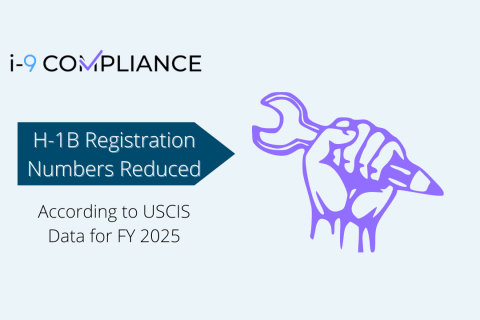USCIS Measures Reduces Number of Multiple H-1B Registrations

U.S. Citizenship and Immigration Services (USCIS) has recently released data for the most recent period. According to the USCIS, this period showed that multiple registrations for workers have drastically reduced. It also reflected positively on the agency’s recent rulemaking to reduce these registrations. The USCIS realized that the repeat registrations represented a significant portion of the overall registration account. As such, the agency believed it could indicate fraudulent attempts to “game” the H-1B lottery selection system.
According to the USCIS’s data, registrations for the 2025 fiscal year declined by over 38% over the previous fiscal year. This data means H-1B registrations decreased from 758,994 filed in 2024’s fiscal year to 470,342 in 2025. The USCIS believed the significant decrease in multiple registrations accounted for most of this difference.
Many assume the USCIS’s measures to reduce potential fraud in the registration process caused these changes. One measure included adjustments to the selection process. In this example, the process changed to base selections on beneficiaries, not the employers. Another measure the USCIS took involved extensive investigations of alleged fraud in the 2023 and 2024 fiscal years. Now, the USCIS will consider each registrant only once, regardless of the number of registrations filed on their behalf.
For the Fiscal Year 2025 lottery, the USCIS selected 114,017 beneficiaries, which resulted in 120,602 selected registrations. This indicates that a relatively small number of these selected beneficiaries had multiple registrations filed on their behalf. However, the USCIS reported an average of only 1.06 registrations per beneficiary in Fiscal Year 2025. This percentage significantly dropped from an average of 1.70 in Fiscal Year 2024.
Despite the considerable decrease in overall registrations, the number of unique beneficiaries remained similar to the previous year: 442,000 compared with 446,000 for the previous year. These numbers reflect the results of reducing multiple registrations for beneficiaries.
Those with multiple registrations must choose which employer will sponsor their petition. Based on current selection numbers, whether the USCIS will perform a second lottery remains uncertain. The agency will decide the likelihood based on the number of successfully filed petitions, which must fill the 85,000 available H-1B visa slots. It must decide before the deadline on June 30, 2024.
Employers of H-1B workers must complete the employment eligibility verification (Form I-9) process. This process requires employers to verify all employees’ identity and work authorization, regardless of citizenship status. However, due to the ever-changing regulations, many employers have found the I-9 process challenging to comply with.
One way to ensure consistent compliance is to utilize an electronic I-9 management system. This system offers guidance through the process, secure digital storage and notifications of when to take further action. It also has an E-Verify integration option for companies using E-Verify.
Increase your hiring and verification efficiency today with I-9 Compliance automation.